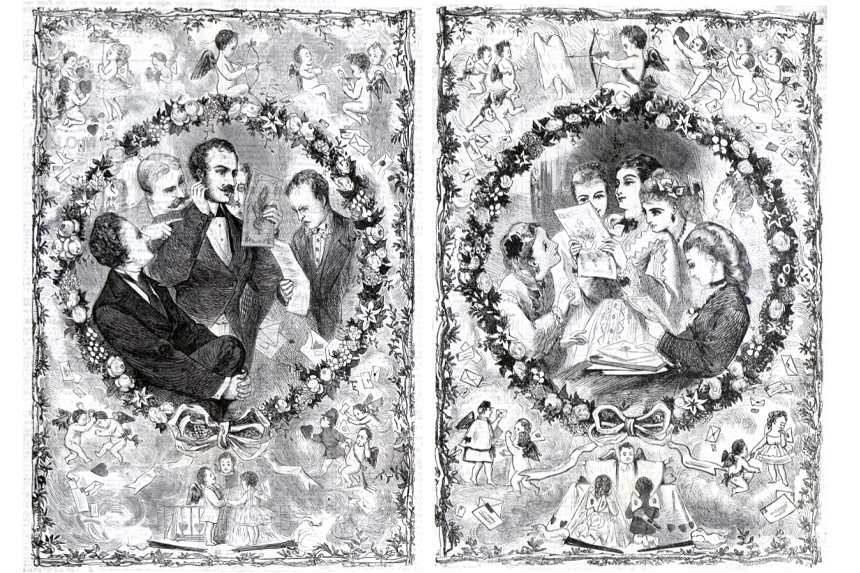Roses are red, but violets aren’t blue, and if you use this erroneous cliché in a card to your sweetheart they might just dump you.
Is your holiday missive missing something? You needn’t be a brilliant bard to impress your Valentine with some heartfelt verse. Steal it from us instead! Here are some clever and romantic quotations taken straight from obscurity to grace your letter to your beloved.
“Said a Lover” by Katharine Scott (July 12, 1930)
I envy him Love first did give
The idea for the adjective,
Who first did find for passioned state
The barren noun inadequate,
And, leaning to his mistress’ ear,
Made the small words of “sweet” and “dear.”
If I had lived when Love was young,
Before a thousand years of song
Made “lovely” worn and tarnished stand,
And “beautiful” so secondhand;
When “fair” was fresh, and “charming” new,
Perhaps I should have words for you!
From “Song of a Contented Heart” by Dorothy Parker (February 24, 1923)
All sullen blares the wintry blast;
Beneath gray ice the waters sleep.
Thick are the dizzying flakes and fast;
The edged air cuts cruel deep.
The stricken trees gaunt limbs extend
Like whining beggars, shrill with woe;
The cynic heavens do but send,
In bitter answer, darts of snow.
Stark lies the earth, in misery,
Beneath grim winter’s dreaded spell—
But I have you, and you have me,
So what the hell, love, what the hell!
“Any Lover to His Love” by Mary Dixon Thayer (June 13, 1925)
Where you have been the lilies blow
More thickly, and the grass is sweet
Where you have touched it with your feet.
Where you have been, and where you go
The world is fair — so fair!
Your laughter trembles in the air.
Where you have been I wander, and
The lilies and the grass
Utter your beauty as I pass.
Even the blind clouds understand
What loveliness by all is seen
Who walk where you are, or have been.
“Juliet on the Balcony” by Howard Glyndon (January 12, 1878)
O lips that are so lonely
For want of his caress;
O heart that art too faithful
To ever love hint less;
O eyes that find no sweetness
For hunger of his face;
O hands that long to feel him
Always, in every place.
My spirit leans and listens,
But only hears his name,
And thought to thought leaps onward
As flame leaps unto flame;
And all kin to each other
As any brood of flowers,
Or these sweet winds of night, love.
That fan the fainting hours!
My spirit leans and listens,
My heart stands up and cries,
And only one sweet vision
Comes ever to my eyes.
So near and yet so far love,
So dear yet out of reach,
So like some distant star, love,
Unnamed in human speech!
My spirit leans and listens,
My heart goes out to him,
Through all the long night watches,
Until the dawning dim;
My spirit leans and listens,
What if, across the night
His strong heart send a message
To flood me with delight?
“A Question of Terminology” by Robert Zacks (February 16, 1946)
How absurd a heart can be!
When it’s bound, it feels most free.
When it’s free, it wanders round
Seeking, so it can be bound.
All this simply means to me
Words do not say as they sound;
Freedom’s not till love is found.
From “Love Song” by Charles Gavan Duffy (June 21, 1856)
The face of my Love has the changeful light
That gladdens the sparkling sky of spring;
The voice of my Love is a strange delight,
As when birds in the May-time sing.
Oh, hope of my heart! Oh, light of my life!
Oh, come to me, darling, with peace and rest!
Oh, come like the summer my own sweet wife,
To your home in my longing breast!
“The Sum Total” by Patience Eden (November 15, 1930)
In casting up some old accounts
Of psychological amounts,
I find, my dear, you have a way
Of being far more good than gay:
And when I think you’re most alive,
You’re merely bland instead of blithe,
You have a cool and classic mind,
Less brave than bright, more keen than kind;
The values of your character
Merge in a grand, majestic blur
Of awesome traits — and yet, my dear,
It’s what you’re NOT which seems most clear.
“Contentment” by Philip I. Blakesly (March 16, 1940)
When an ocean is least,
Or a world or a star,
Who cares what is most?
When the cup is full,
When the heart overflows,
There is only that —
There can be no more.
And a cup will suffice for a grander measure;
When the mind’s at rest, what more is a treasure?
Become a Saturday Evening Post member and enjoy unlimited access. Subscribe now




Comments
Each and every one of these poems are wonderful, and fascinating. You did a lot of impressive work in finding these diverse offerings, as you do in finding your topics to write about otherwise, Nicholas.
Honestly don’t have a favorite here. Although I LOVE the English language of the 19th and early 20th centuries, the “new” one here from 1940 is one of the best!